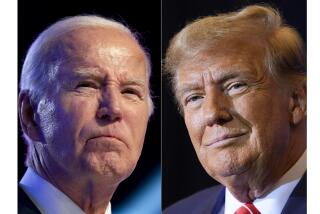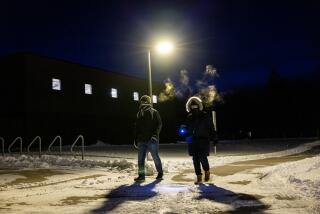When Reverends Run
- Share via
WASHINGTON — The news was barely out about Republican presidential candidate Marion G. (Pat) Robertson’s first child being born less than nine months after his marriage when, lo and behold, it turned out that the other Southern preacher in the race--Democrat Jesse Jackson--had much the same problem. But, if anything, their respective political flocks have actually rallied round. Robertson seems to be a more solid third in the GOP nomination race than three weeks ago. And barring further revelations, he still looks like the critical wild card in the pivotal opening weeks of the 1988 campaign. Like Jackson, he can’t win. But he may determine which Republican does--and on how extreme a platform.
Talk about how Robertson’s new embarrassments limit his intraparty Republican appeal is also overblown. Beyond the churches, his voter-outreach potential has always been minimal. Some 50%-75% of GOP voters tell pollsters they view Robertson negatively or simply won’t support him for President. He’s mobilizing faithful, not converting the heathen. Fence-sitting moderates jumped a year ago, after the media showed film clips of the televangelist promising faith could cure hemorrhoids and praying a hurricane away from Virginia (only to have it hit Long Island and New England--a bad electoral exchange).
No, the essence of Robertson’s potential importance is less ecumenical than strategic. After studying the 1988 Republican primary and caucus calendar, he cannily determined that his church-based cadres--3.3 million have already signed his petitions--could have a terrific impact in a number of key early confrontations. Skills like these mock secular America’s image of a narrow Dixie Bible-thumper. Sure, there’s a side of Robertson that sounds like Elmer Gantry, Sinclair Lewis’ famous fictional preacher-opportunist of the 1920s. But the South has also produced some of America’s greatest strategists and guerrilla warfare practitioners--from “Swamp Fox” Francis Marion in the Revolution to John Mosby, Stonewall Jackson and Bedford Forrest in the Civil War--and there’s much of that tradition and acumen in Robertson. Like some of history’s great generals, he’s forcing his foes to fight where he wants.
Even a quick look at the 1988 war map will confirm that the GOP nomination is being fought on substantially new territory--a battleground Robertson may have been the first to scout carefully. Previous campaigns in both parties started slowly, with nothing much happening besides the Iowa caucuses and then, two weeks later, the New Hampshire primary. Little-known candidates were able to concentrate time and attention to break through: Witness Jimmy Carter’s Iowa-based come-from-nowhere Democratic emergence in 1976. But 1988’s new schedule, especially on the Republican side, is far more crowded and confusing--a chronological checkerboard tailor-made for guerrilla warfare.
A whole roster of states out to wield new influence have accelerated their Republican primaries or caucuses into the five weeks before March 8 and “Super Tuesday.” The list begins with Hawaii, where the last name of Sen. Bob Dole (R-Kan.) waves over the pineapple fields on Jan. 27. Then Michigan on Jan. 29-30. Iowa’s no-longer first-in-the-nation caucuses come on Feb. 8, followed by New Hampshire on Feb. 16, South Dakota and Minnesota on Feb. 23, Maine on Feb. 28, Vermont on March 1 and Wyoming, Kansas and South Carolina on March 5.
What used to be a sparsely populated section of the calendar has become a strategic thicket. During these five weeks, 11 states will vote on eight different dates. Two-thirds will be up-front decision-makers for the first time. Nobody knows how the various dominoes will prop or topple one another. But after five weeks, 11 verdicts and hundreds of media distillations, half of the six Republican candidates now running will probably be casualties--and that’s before Super Tuesday. Even front-runners Vice President George Bush and Senate Republican Leader Dole could be at risk.
Let me underscore the unpredictability. Seven of the early 11 state decision-making mechanisms are caucuses, where devoted cadres--true-believing churchgoers, in Robertson’s case--can be decisive. Moreover, the primaries are all in small states--New Hampshire, South Dakota, Vermont and South Carolina--where organization, planning and voter mobilization can be atypically effective.
Take Michigan, where late January’s district caucuses will provide the campaign’s first major battleground. A year ago, Robertson forces swamped the preliminary precinct conventions, overpowering allies of Bush. That eventually gave Robertson control of the Republican state committee. Now, barring court intervention, Michigan’s caucuses will select Robertson delegates. And some inevitable momentum will ride with them.
Next come the critical Iowa caucuses, another target of Robertson organizers. On Sept. 12, he won the official Iowa GOP straw poll, pushing Dole into second place and Bush to third. Insiders say they’re sure it can’t happen again on Feb. 8. But nobody will bet the proverbial farm.
Robertson’s strength in New Hampshire, voting on Feb. 16, is more enigmatic. If 50,000 local petition-signers can be converted into 35,000 primary votes, the Virginian could come in second. Late February’s caucuses in Minnesota, where the religious right controls at least two congressional districts, could also be fruitful.
Will South Carolina’s March 5 primary grab the next media spotlight as a prelude to the big Dixieland contest three days later on Super Tuesday? Robertson thinks so. Bush advisers worry that Robertson could get 40% of the vote, particularly if supporters of other contenders back the ex-evangelist to embarrass the vice president. Similar possibilities exist in next month’s ballyhooed Florida GOP convention straw poll. Because state Republican leaders tailored the mechanics to insure a Bush win, forces for Dole and for Jack Kemp refuse to participate. But reports have local Dole and Kemp managers telling supporters to back Robertson.
It’s clear that the first five weeks of the 1988 GOP nomination race will be fought out on a largely unfamiliar battlefield not entirely representative of the rest of the contest. In such an environment, campaigns top-heavy with money, prestige and high-ranking endorsements--Bush’s comes to mind--lose their advantage like cavalry charging into a wooded swamp. Of the 11 states involved, the vice president can only bank on one or two. Meanwhile, Dole has four potentially friendly farm states--Iowa, South Dakota, Minnesota and then his own Kansas--in which to talk about growing up knee-high to a grain elevator. But the principal unnatural advantage is Robertson’s. He could conceivably finish first or second in four or five states, greatly embarrassing two or three “serious” rivals each time.
Once these five weeks roll by, the fighting will move to Super Tuesday and Southern Baptist territory where Robertson could continue to do fairly well. Then come the big media markets--Illinois, Pennsylvania, New York, Ohio, New Jersey and California. Here the advantage shifts to money and name recognition. Manhattan jibes, Hollywood sneers and old hemorrhoid-cure clips may well rule the prime-time airways. And in states where Sunday morning’s major suburban preoccupation is Belgian waffles and where Republican county committees worship at the local golf club, Robertson’s bandwagon will probably stall. The candidate’s hopes of going to the New Orleans convention with 20%-25% of the delegates should slide down to the 10%-15% range.
But faith-healing quips and smirks about marital timing notwithstanding, Robertson is nobody’s joke.
Unless more damaging revelations emerge, his effect on the outcome of the Republican nomination race could be enormous, especially during the pivotal five-week preliminary melee. And the same is true of Jackson in the Democratic contest. The more the rest of the Democrats mill about in strategic confusion, the more Jackson’s 15%-25% backing could be pivotal. The two Southern preachers may not be able to win in 1988 but, for better or worse, they may have plenty to do with who does.
More to Read
Get the L.A. Times Politics newsletter
Deeply reported insights into legislation, politics and policy from Sacramento, Washington and beyond. In your inbox twice per week.
You may occasionally receive promotional content from the Los Angeles Times.










